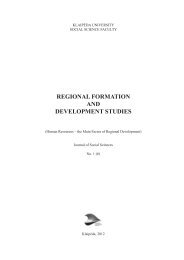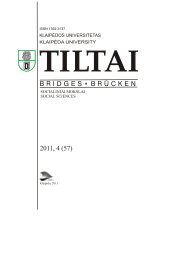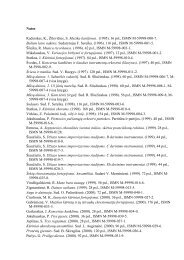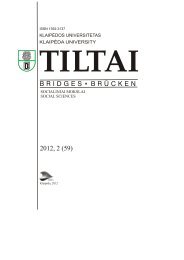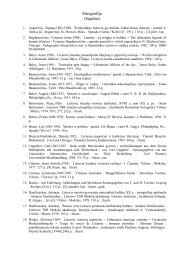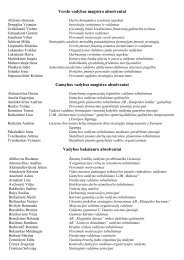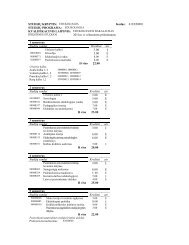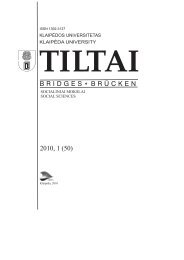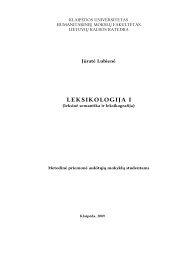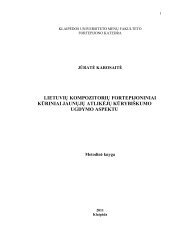2013,1 (62) - KlaipÄdos universitetas
2013,1 (62) - KlaipÄdos universitetas
2013,1 (62) - KlaipÄdos universitetas
Create successful ePaper yourself
Turn your PDF publications into a flip-book with our unique Google optimized e-Paper software.
Anne Koskiniemi, Juha Perttula<br />
verification. In those studies, self-enhancement refers to the motive of accepting the favourable<br />
feedback. Therefore, positive feedback, as such, would have a stronger effect than<br />
consistency between content of the feedback and the recipient’s self-image. The results of<br />
this study do not support this interpretation. However, the mechanisms of the effects of<br />
positive feedback may be complex as was seen in the Greller and Parsons (1992) study. It<br />
appeared that when task feedback is favourable, recipients pay less attention to feedback<br />
from others, and when task feedback is unfavourable, they pay more attention to feedback<br />
from others.<br />
Our results imply that positive feedback enhances a recipient’s self-confidence or<br />
her confidence to work (variants 1, 3, 4, 5 and 6). It is congruent with the finding that<br />
rewarding feedback from a manager provides supportive feelings simultaneously to<br />
the followers' self-efficacy and to the confidence towards their own work (Berlin,<br />
2008). However, high-quality positive feedback may be associated with overestimating<br />
one's own performance (Plakht et al., 2012).<br />
Work, in itself, is a source of positive feedback when a team leader is pleased with the<br />
work done (variants 1, 2, 3 and 7). This relates to the finding that task feedback is associated<br />
more strongly with self-rating than feedback from others. It is concluded that the<br />
strongest predictor of constructive self-evaluation is positive task feedback (Greller &<br />
Parsons, 1992). Task feedback is discovered to be positively related to job satisfaction and<br />
to diminishing feelings of role ambiguity. Even though self-feedback concerning job performance<br />
is rated as a more useful and consistent feedback than task feedback, it did not<br />
predict job satisfaction (Andrews & Kacmar, 2001). In this study, however, neither self<br />
nor task appeared clearly as the most important feedback source. Herold and Parsons<br />
(1985) suggest that sources of task and self should not be seen as separate but rather as a<br />
“stimulus complex” formed together. More recently, Andrews and Kacmar (2001) found<br />
that self-feedback and task feedback have different kinds of relations, which indicates that<br />
the two sources should be seen as separate. The possible interpretation is that receiving<br />
task feedback depends on an individual’s tendency to be internally oriented towards feedback<br />
(see Herold, Parsons & Fedor, 1997).<br />
The results displayed how mental closeness with co-workers makes received positive<br />
feedback more credible (variants 2, 3, 4 and 5). The same effect took place in the manager-team<br />
leader relationship (variants 1, 4 and 5). Our findings are in line with the results<br />
about the importance of a close relationship between the feedback giver and the<br />
recipient and the effectiveness of received positive feedback (Berlin, 2008; see also Ilgen<br />
et al., 1979). Experienced credibility towards a feedback source is associated with<br />
the satisfaction regarding feedback received from that source (Steelman et al., 2004).<br />
These results can be understood in the context of the leader-member exchange theory.<br />
According to the theory, leaders form different kinds of exchange relationships with<br />
their employees. Depending on the relationship, an employee can be either an in-group<br />
or out-group member. In-group members have high-quality exchange relationships with<br />
their leader while out-group members have low-quality relationships. It has been discovered<br />
that in-group members of leader-member exchanges were the most satisfied with<br />
personal feedback and supervisory communication (Mueller & Lee, 2002).<br />
70



